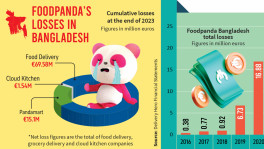Genocide by Pak Army in former east Pakistan needs to be globally recognised
The Bangladesh genocide is considered to be the largest and longest since it covers the entire length of the nine-month-long liberation war of Bangladesh

It is matter of shame that the genocide committed by Pakistan in Bangladesh 50 years ago, which killed more than the holocaust and was aimed at changing ethnicity of a group, is yet to be globally recognised, according to a Paris-based think tank.
In a report of the Center of Political and Foreign Affairs on East Pakistan Genocide: Still Yearns for Global Acknowledgement, Mario de Gasperi wrote, " The Bangladesh genocide is considered to be the largest and longest since it covers the entire length of the nine-month-long liberation war of Bangladesh. Ironically the Bangladesh genocide remains unrecognised while other genocides in Europe and Africa have been acknowledged."
According to the report, three million people were killed, half-a-million girls and women were raped, and entire villages were laid to waste. Men became primary targets (almost 80 per cent male, as reported by the Bangladesh Genocide Archives). The abduction and subsequent rape of women by soldiers took place in camps for months. Many more were subject to "hit and run" rapes. Hit and run rape explains the brutality of forcing male family member-before their own death-view the rape of their female family member by soldiers.
Bangladesh is celebrating 50 glorious years of its independence this year. However, the month of March is significant in the valiant struggle in Bangladesh that then East Pakistan people waged against the Pakistani Army.
March 25 holds special significance being commemorated as the Genocide Day as on this day 50 years back Pakistan Army launched 'Operation Searchlight' resulting in the worst genocide in human history over a period of nine months till the Army was defeated, Gasperi wrote.
Gasperi further said, "The Liberation War in erstwhile East Pakistan marked by the horrific genocide committed by the Pakistani Army and razakars, or collaborators, is not acknowledged widely even to this date."
"In national elections held in December 1970 in undivided Pakistan, the Awami League won an overwhelming victory across Bengali territory. On February 22, 1971 the generals in West Pakistan took a decision to crush the Awami League and its supporters. It was recognized from the first that a campaign of genocide would be necessary to eradicate the threat," wrote Gasperi.
Bangladesh, erstwhile East Pakistan witnessed almost a full collapse of humanity during the nine months of March to December in 1971. Though atrocities and brutality started well before March 1971, continuation of this barbarism reached its peak on the night of March 25, 1971.
Gasperi said, "The carnage by Pakistan Army continued till their shameful surrender in mid-December, 1971. Atrocities and butchery of Pak Army are by now well established and documented not only by Bangladeshis but also international researchers, historians, scholars and news media."
"General Agha Mohammed Yahya Khan and his top generals planned to murder Bengali intellectual, cultural, and political elite. They also planned to indiscriminately murder hundreds of thousands of Hindus and drive the rest into India. And they planned to destroy East Pakistan's economic base to ensure that it would be subordinate to West Pakistan for at least a generation to come," Gasperi wrote in the report.
Gasperi further said in the report that there is no doubt that the mass killing in Bangladesh was among the most carefully and centrally planned of modern genocides. The genocide and gendercide atrocities were also perpetrated by lower-ranking officers and ordinary soldiers. These "willing executioners" were fuelled by abiding anti-Bengali racism, especially against the Hindu minority. "Bengalis were often compared with monkeys and chickens. Said Pakistan General Niazi, 'It was a low lying land of low lying people.'
The goal of the operation was to crush the Bengali nationalist movement through fear; however, the opposite occurred.
Highlighting the three phases of genocide by the Pakistan Army, Gasperi wrote, that Operation Searchlight was the first phase, which took place from late March to early May. It began as a massive murder campaign during the night of March 25, 1971.
"Search and destroy was the second where Pakistani forces methodically slaughtered villages from May to October. This is the longest phase because this is when Bengali forces mobilised and began to fight back. This was also the phase in which the Pakistan army targeted women to rape, abduct, and enslave."
"Scorched Earth" was the third phase beginning in early December, and targeted and killed 1,000 intellectuals and professionals such as doctors, lawyers, and engineers in Dhaka. The Pakistani Army surrendered to Indian forces days later, ending the genocide on December 16, 1971," Gasperi wrote.


 Keep updated, follow The Business Standard's Google news channel
Keep updated, follow The Business Standard's Google news channel















